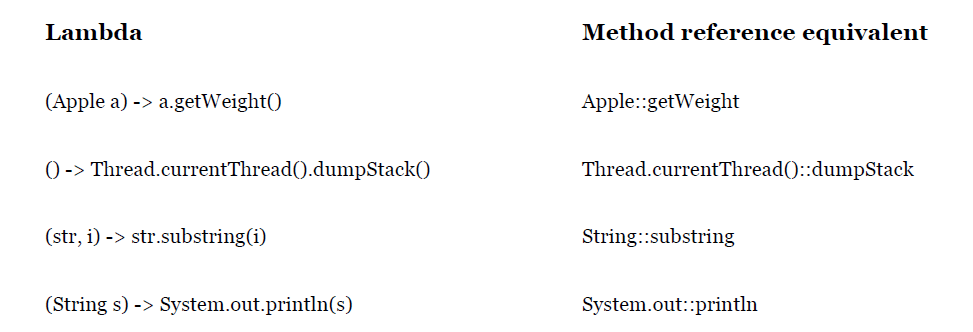原创转载请注明出处:https://www.cnblogs.com/agilestyle/p/12807844.html
Examples of lambdas and method reference equivalents

There are three main kinds of method references:
1. A method reference to a static method
(for example, the method parseInt of Integer, written Integer::parseInt)
2. A method reference to an instance method of an arbitrary type
(for example, the method length of a String, written String::length)
3. A method reference to an instance method of an existing object
(for example, suppose you have a local variable expensiveTransaction that holds an object of type Transaction, which supports an instance method getValue; you can write expensiveTransaction::getValue)
Demo
MethodReferenceTest.java
1 package org.fool.java8; 2 3 import java.util.function.BiFunction; 4 import java.util.function.BiPredicate; 5 import java.util.function.Function; 6 import java.util.function.Supplier; 7 8 public class MethodReferenceTest { 9 public static void main(String[] args) { 10 /* 11 * A method reference to a static method 12 */ 13 Function<String, Integer> function1 = Integer::parseInt; 14 Integer result1 = function1.apply("123"); 15 System.out.println(result1); 16 17 /* 18 * A method reference to an instance method of an arbitrary type 19 */ 20 BiPredicate<String, String> predicate = String::endsWith; 21 boolean result2 = predicate.test("hello", "world"); 22 System.out.println(result2); 23 24 /* 25 * A method reference to an instance method of an existing object 26 */ 27 Person person = new Person("zhangsan", 18); 28 Supplier<String> result3 = person::getName; 29 System.out.println(result3.get()); 30 31 // BiFunction 只接收 2 个参数 32 BiFunction<String, Integer, Person> function = Person::new; 33 Person person1 = function.apply("zhangsan", 18); 34 System.out.println(person1); 35 36 // TriFunction 自定义实现接收 3 个参数 37 TriFunction<String, Integer, String, Person> triFunction = Person::new; 38 Person person2 = triFunction.apply("lisi", 28, "female"); 39 System.out.println(person2); 40 } 41 42 @FunctionalInterface 43 public interface TriFunction<T, U, O, R> { 44 R apply(T t, U u, O o); 45 } 46 47 private static class Person { 48 private String name; 49 private Integer age; 50 private String sex; 51 52 public Person(String name, Integer age) { 53 this.name = name; 54 this.age = age; 55 } 56 57 public Person(String name, Integer age, String sex) { 58 this.name = name; 59 this.age = age; 60 this.sex = sex; 61 } 62 63 public String getName() { 64 return name; 65 } 66 67 public void setName(String name) { 68 this.name = name; 69 } 70 71 public Integer getAge() { 72 return age; 73 } 74 75 public void setAge(Integer age) { 76 this.age = age; 77 } 78 79 @Override 80 public String toString() { 81 return "Person{" + 82 "name='" + name + '\'' + 83 ", age=" + age + 84 ", sex='" + sex + '\'' + 85 '}'; 86 } 87 } 88 }
Console Output
123 false zhangsan Person{name='zhangsan', age=18, sex='null'} Person{name='lisi', age=28, sex='female'}